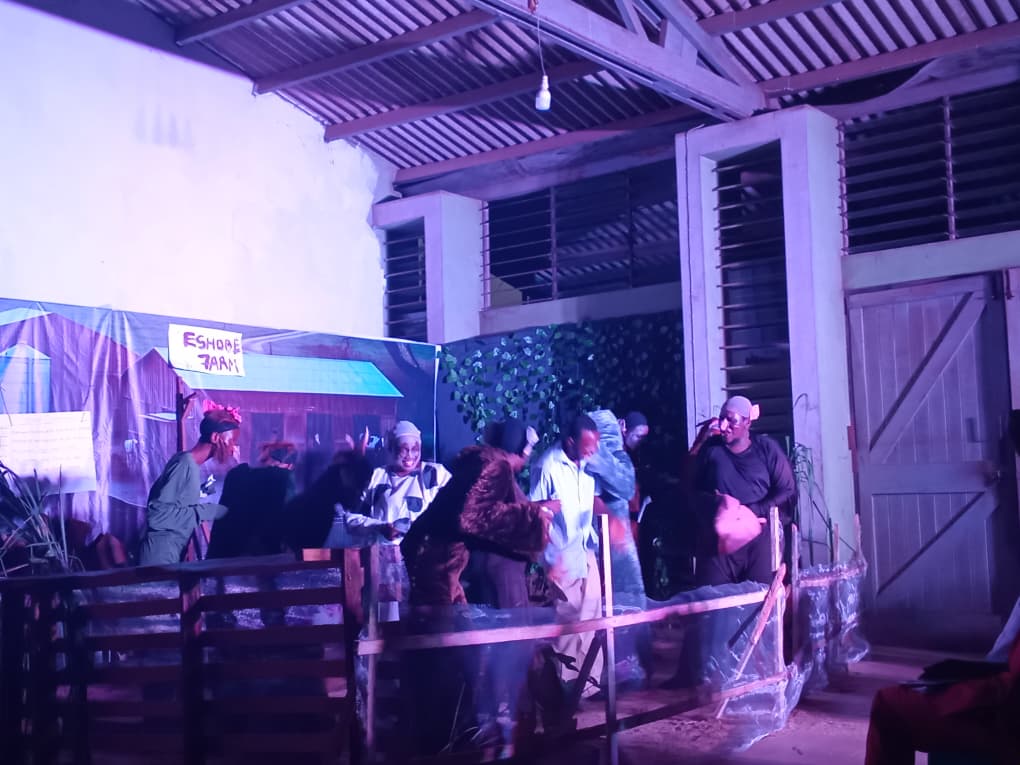July 2025
Somewhere through the second act of Eshube, my thoughts drifted to consider how many after me would witness George Orwell’s 1945 novella, Animal Farm, come to life in this fashion. Surely not enough! It was the finale of the show’s three-day run. I was in a garage-turned-studio, immersed in this Pidgin-English adaptation of the seminal satire. I took in the sun’s fading rays just as Napoleon – Oga Napo here – declared his fellow animals’ rations cut to 1/8th. And I was splendid, simply splendid.
Eshube inquires, “What would happen if Mr Jones’ Manor Farm were set in Nigeria’s Bendel region (now Delta and Edo states)?”. It unravelled this in under two hours, following mostly renamed characters: Oga Josiah, Fowler, Cowmena, Pigatus, Dogmatic, Oga Benji, Chipobe, Farmer Fred, and others. It examined the universality of greed and class differences, arriving at the same unpalatable conclusion as Orwell’s eighty-year-old original – that betrayal is innate in all animals.
To achieve this, Eshube drew from contemporary pop culture as a plot device. The animals sang the choruses on Rihanna’s “Work” and Shallipopi and Odumodublvck’s “Cast” (substituting wig and handbag for food and welfare) as they went about duties. Deeper references like the placement of the Battle of the Cowshed on October 20, after the #EndSARS protest, and the ‘Animal Planning Committee’, after the ruling All Progressive Congress, layered the story as a satire of Nigeria. Although somewhat excessive by the end, the cast’s cohesive acting meant these references enhanced the story’s experience. That, as well as impressive costuming and set design – complete with a barn, grass and a makeshift rooster comb – gave the farm a deeper sense of realism.
I’d have preferred if the animals’ motivations were further explored in place of some comedic scenes. More than once, it came across as if ‘story’ was being compromised for ‘spectacle’, especially in the third act, where bloated dialogue failed to convey the animals’ grief at being cheated. Regardless, John Oluwadare’s direction papered those cracks, with economical space management, standout deployment of strobe lighting to portray chaos, and efficient symbolism, amongst other positives.
The animals might have lost in the end. Still, we, the audience, walked home richer — bellies filled with reflections on class imbalance and a greater appreciation for the musicality of Pidgin. At least, I know I did.
November 2025
That theatre is a medium existing in the present doesn’t foreclose the possibility of future discoveries. It’s art, after all. And art requires engagement. I am Roxanne Gay, writing about Beyonce’s Lemonade more than a year after — humour the parallel.
Last week, I had the mild pleasure of seeing an adaptation of Keye Abiona’s Even Kins Are Guilty at the Wole Soyinka Theatre. It was a good play and I particularly enjoyed the actors’ line deliveries. At the risk of the sin of comparison, it lacked a definitive feature present in other pristine adaptations I’ve seen over the years: It left me without a longing for the source material. The story told on stage seemed complete; as if that was all there could be, the director’s fault, no doubt. Eshube narrowly walked the same rope.
I remember questioning how eager I’d be to read Animal Farm – either the original or Prof. Francis Egbokhare’s adaptation – if this were my first introduction to the material. It didn’t help that the actors’ pidgin came across poorly in many scenes. Still, props must be given for the memorable twists in key sentences and the creativity behind character profiles.
Attention to detail elevated Eshube. The backwards ‘F’ spelling in the Farm’s signage illustrated the pig’s cognitive limitations, even with their education. Heaps of sand ground the set in reality. Acting choices like pronouncing ‘ch’ as ‘sh’ to emulate Warri/Edo pidgin (Wafi) or the narrator’s Hitler salute as she declared “Napo is always right!’ elevated scenes considerably. There’s a moment where Napo pauses all those around to sniff Farmer Fred’s bag of money, and then steals two more sniffs, as the other animals join in the celebration, encapsulating the character’s sheer depravity.
Thematically, Napo is the play’s centrepiece. He is conceited and insulting, unsatisfied with just punishing the other animals. He wants them to wear their inferiority as a first skin. He’s the quintessential despot, complete with sycophants (Squealer) who echo his every decision. He’s the architect of discord. Bigotry incarnate. He is that Nigerian politician; the less said about that, the better.
Four months on, I still consider the play a rich reflection on society. Reality is worse off now that living in this make-believe world would be a treat. “APC l’ẹkan si” and other nightmares. So yes, that’s that.

